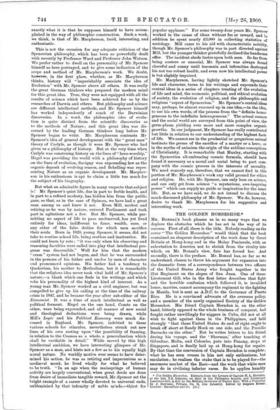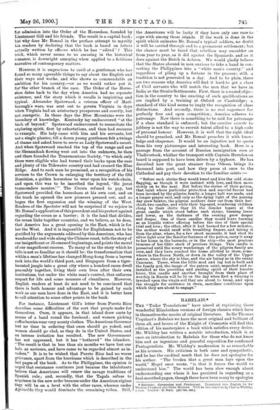THE GOLDEN HORSESHOE.* Mn. Bowslf s book pleases us in
so many ways that we deplore the obstacles which he has set in the way of its success. First of all, there is the title. Nobody reading on the cover " The Golden Horseshoe" would think that the book contained an eloquent description of the work done by Great Britain at Hong-kong and in the Malay Peninsula, with an exhortation to America not to shrink from the rivalry into which, on Mr. Bonsal's view, fate has forced her. And secondly, there is the preface. Mr. Bonsai has, so far as we understand, chosen to throw his argument for expansion into the dramatic form of a correspondence between two officers of the United States Army who fought together in the 21st Regiment on the slopes of San Juan. One of these, Lieutenant Gill, who in the first letter describes that fight and the horrible confusion which followed it, is invalided home, marries, cannot accompany the regiment to the fighting in Manila, but is sent as A.D.C. to the Governor of Puerto Rico. He is a convinced advocate of the overseas policy, and a member of the newly organised Society of the Golden Horseshoe. His friend Captain Herndon is, on the other hand, bitterly opposed to the whole business of conquest, had fought rather unwillingly for niggers in Cuba, did not at all wish to fight against them in the Philippines, and held strongly "that these United States do and of right ought to break off short at Sandy Hook on one side, and the Presidio Barracks on the other." But he writes letters to his friend during his voyage, and the 'Sherman,' after touching at Gibraltar, Malta, and Colombo, puts into Penang, stops at Singapore, and is finally laid up at Hong-kong for repairs. By that time the conversion of Captain Herndon is complete; what he has seen rouses in him not only enthusiasm, but emulation ; he realises the stake that is to be played for—the enormous market of the East—and the work that white men may do in civilising inferior races. So he applies humbly
• The Golden Horseshoe. Extracts from the Letters of Captain H. L. Herndon. of the 21st U.S. Infantry, on duty in the Philippine Islands, and Lieutenant Lawrence Gill, A.D.C. to the Military Governor of Puerto Rico. With a Postscript by J. Sherman, Private, Co. D, 21st Infantry. Edited by Stephen Bonsai.. London : Macmillan and Co. Ds.] for. admission into the Order of the Horseshoe, founded by Lieutenant Gil) and his friends. The result is a capital book; bat why does Mr. Bonsai in the preface attempt to mystify his readers by declaring. that the book is based on letters actually written by officers which he has " edited" ? This trick, which never seems to us amusing in the historical romance, is downright annoying when applied to a fictitious narrative of contemporary matters.
frOwever, it is ungracious to cavil at a gentleman who has found. so many agreeable things to say about the English and their ways and works, and who shows so commendable an ambition. for his country,—or as we would rather put it, for the other branch of the race. The Order of the Horse- shoe dates- back to the day when America had no separate existence, and the story which it recalls is inspiriting and typical- Alexander. Spotswood, a veteran officer of Marl- borough's wars, was sent out to govern Virginia in days when Virginia had an aristocracy prosperous and courtly, but not-energetie. In those days the Blue Mountains were the boundary of knowledge. Kentucky lay undiscovered "at the back of beyond." Spotswood endeavoured to resuscitate the etplozing-spirit, first by exhortations, and then had recourse to 'example. His lady came with him and his servants, but not a single planter, till a 'dozen young gentlemen felt a twinge of shame and asked leave to serve as Lady Spotsvrood's escort. And when Spotswood reached the top of the range and saw the Shenandoah flowing west out into the unknown, he then amithere founded the Transmontane Society, "to which only those were eligible who had turned their backs upon the ease and Plenty of the Tidewater country and had crossed the Blue Ridge. And. to each man he promised, as a recognition of his services: to the Crown in enlarging the territory of the Old Dominion, a golden horseshoe to wear upon his watch-chain, and- upon. this was to be inscribed the legend, 'Sic juvat transcendere monies.". The Crown refused to pay, but Spotswnod provided. the horseshoes at his own cost, and on the_ track_ he opened the new. pioneers pressed out, and so began the first expansion and the . winning of the West. Readers of the Spectator will not be surprised if we rejoice in Mr. Bonsai's application of this precedent and his protest against regarding the ocean as a barrier; it is the land that divides, the ocean links together countries, and we believe, as he does, that America has a great opening in the East, which is for her the West. And it is impossible for Englishmen not to be gratified by the arguments adduced by this American, who has wanderer:liar and wide along the Chinese coast, tells the story of our insignificant or ill-omened beginnings, and points the moral of OUT magnificent success. To many of us the story which he tells is not so familiar as it should be; the transformation that within a man's lifetime has changed Hong-kong from a barren rock into_the world's third port, and Singapore from a tiger- haunted jungle into a great city where a hundred races dwell peaceably together, living their own lives after their own institutions, but under the white man's control, that enforces respect for life and some measure of cleanliness. However, English readers at least do not need to be convinced that there _is both honour and advantage to be gained by such work as our men have done in the East, and it is better here to call, attention to some other points in the book.
For instance, Lieutenant Gill's letter from Puerto Rico describes some difficulties of the sort that people make for themselves. Oxen, it appears, in that island draw carts by means of a band round the forehead; and women picking coffeeberries wear very scanty clothes. The American Governor lost no time in ordering that oxen should go yoked, and women should go clad, as they do in the United States, and an intense irritation has resulted. The new Government has not oppressed, but it has " bothered " the islanders. "The result is that in less than six months we have lost our halo as saviours, and have come to be regarded almost as in- vaders." It is to be wished. that Puerto Rico had no worse grievance, apart from the hurricane which is described in the last pages of the book. As to the Philippines, the opinion is Urged that resistance continues just because the inhabitants believe that Americans will renew the savage traditions of Spanish rule.; and, secondly, that the Ta.gals refuse to acquiesce in the new order because under the American regime thy will be on a level with the other races, whereas under AgranaldO they walla dominatethe remaining tribes. Still,
the Americans will be lucky if they have only one raoa to cope with among those islands. If the work is done in the spirit which animates Mr. Bonsai's typical soldiers, no doubt it will be carried through and to a permanent settlement; but the chance must be faced that rebellion may smoulder on from year to year, as it did against the Spaniards, and as it does against the Dutch in Acheen. We would gladly believe that the States abound in men anxious to take a hand in con- verting the Philippines into a "white man's country," and. regardless of piling up a fortune in the process; still, a tradition is not generated in a day. And to be plain, there are two reasons why America will find it hard to get a class of Civil servants who will match the men that we have in India or the Straits Settlements. First, there is a rooted objec- tion in the country to the exacting of such qualifications as are implied by a . training at .Oxford or. Cambridge ; • a standard of this kind seems to imply the recognition of class distinctions. And secondly, there is no real eagerness for perfectly free and open competition ; America adheres to patronage. Now there is something to be said for patronage if a class standard is enforced; but the carriers ouverte to jobbery is not the way to recruit talent allied to a high code of personal honour. However, it is well that the right ideal should be preached, and Mr. Bonsai.. preaches it with -know- ledge and eloquence. It would be an injustice not to quote from his very picturesque and interesting book. Here is a passage from the account of Russian immigration seen at Vladivostock, whither the transport with Captain Herndon on board is supposed to have been driven by a typhoon. He has described how the great steamer. from Odessa brings its thousand into port, and how they press at once to .the Cathedral and pay their devotion to the familiar saints :—
Before each shrine they would kneel and kiss the cold stone flagging, as though it were instinct with love, and then move slowly on to the next. But before the shrine of their patron, that :saint whose particular protection and especial favour had been invoked by the pilgrim family, a longer halt was made, and a longer prayer said, and only as the dying light of the passing day grew fainter, the pilgrim mothers drew out from their ker- chiefs two candles, and while their big-eyed, wondering children clung to their skirts they lit the slender tapers at the great candle which stood before each shrine, burning lower and lower, as the darkness of the evening grew deeper and deeper. One of these candles they would leave burning as an humble votive offering before the ikon of their special trial and love ; the other, after it had burned for a few minutes, the mother would snuff with trembling fingers, and taking it from the altar, where, for a few short moments, it had shed its' silver light over the familiar features of the patron, carry it away to her home in the barracks, or in the ship—the most precious treasure of her little stock of precious things. This candle is preserved until the weary wanderings of the pilgrim family are over, and they have reached the home allotted to them, some- where in the frozen North, or down in the valley of the Upper Amoor, where the sky is blue, and the air balmy as in the sunny Caucasus. There, when the little mud and log hut is built and the family god, the image of the patron saint, unpacked and re. installed as the presiding and guiding spirit of their humble home, this candle and another brought from their place of worship in Russia will be lit on the day when first a blessing is invoked upon the virgin soil they are about to break, and upon the struggle for existence in stern, merciless conditions upon which they are about to engage."







































 Previous page
Previous page